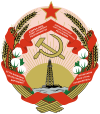You can help expand this article with text translated from the corresponding article in Russian. (September 2020)Click [show] for important translation instructions.
|
My father’s relations were excellent with the First Secretary of the Azerbaijan Communist Party, Jafar Bagirov. The two men had no secrets from each other. [...] This man spoke Turkish and Iranian [sic] perfectly, had a lively mind, was able to find his bearings quickly in the most diverse situations, and had shown himself to be a competent administrator, well informed about the oil industry. He did not drink and believed in neither God nor the Devil, and still less in communism. [5]
First Secretary of the Communist Party
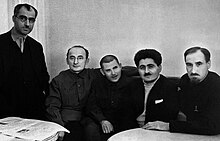
Baghirov was the first secretary of the Central Committee of the Azerbaijan Communist Party from December 1933 to April 1953. He was the only regional party boss apart from Andrei Zhdanov in Leningrad to remain in office throughout the Great Purge, during which more than 10,000 people in Azerbaijan were shot on charges of plotting to assassinate Baghirov. [6] In October 1937, he was raised to full membership of the Central Committee of the Communist Party of the Soviet Union after a clutch of incumbents had been denounced as "enemies of the people".
On 7 March 1953, just after the death of Joseph Stalin, Baghirov was appointed a candidate member of the Presidium (Politburo) of the Central Committee, which means that he was officially the most senior communist official based in any of the smaller Soviet republics outside Russia. [7] On 21 April, he transferred himself to the post of chairman of the Council of Ministers of the Azerbaijan SSR, but on 19 July was sacked, in the wake of the arrest of Beria.
Trial and execution
Baghirov was arrested in 1954 and charged with having been a bandit during the Russian Civil War, with having been responsible for the deaths of a large number of senior Azerbaijani communists during the Great Purge, including Gazanfar Musabekov, Huseyn Rahmanov, Hamid Sultanov, Ayna Sultanova and many more, and of "being one of the most active and intimate accomplices of the traitor Beria." He was tried with five others at a special session of the Military Collegium of the USSR Supreme Court in Baku on 12–26 April 1956. [8] In his final 17-minute speech before the court, he favored the sentence and refused to apply for any pardon. Baghirov was executed in 1956. [3] [9]
Mir Jafar Baghirov is a controversial figure in Azerbaijani history. By 1940 an estimated 70,000 Azerbaijanis had died as a result of purges carried out under Baghirov. [10] The intelligentsia was decimated, broken, and eliminated as a social force and the old guard Communist elite was destroyed. However, Baghirov was also successful in resisting the Armenian demands to cede the Nagorno-Karabakh Autonomous Oblast of the Azerbaijan SSR to the Armenian SSR. [11]
He was credited for treating his junior son as an ordinary Soviet citizen. Baghirov sent his son, Vladimir (Jahangir) Baghirov, a military pilot, to the Soviet Army to fight against Nazi Germany. He was killed in battle in June 1943, after performing an aerial ramming. [12]
Honours and awards
- Order of the Red Banner (twice)
- Five Orders of Lenin
- Order of the Red Banner of Labor (twice)
- Order of the Red Banner of the Azerbaijan SSR
- Order of the Patriotic War
Related Research Articles
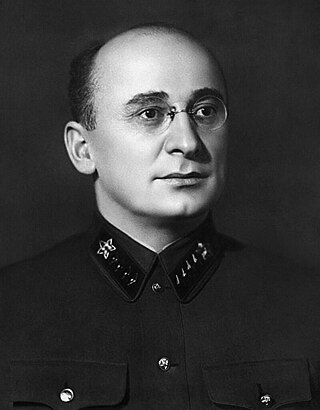
Lavrentiy Pavlovich Beria was a Soviet politician and one of the longest-serving and most influential of Joseph Stalin's secret police chiefs, serving as head of the People's Commissariat for Internal Affairs (NKVD) from 1938 to 1946, during the country's involvement in the Second World War. Beria was also a prolific sexual predator, who serially raped scores of girls and young women, and murdered some of his victims.

The Georgian Soviet Socialist Republic, also known as Soviet Georgia, the Georgian SSR, or simply Georgia, was one of the republics of the Soviet Union from its second occupation in 1921 to its independence in 1991. Coterminous with the present-day republic of Georgia, it was based on the traditional territory of Georgia, which had existed as a series of independent states in the Caucasus prior to the first occupation of annexation in the course of the 19th century. The Georgian SSR was formed in 1921 and subsequently incorporated in the Soviet Union in 1922. Until 1936 it was a part of the Transcaucasian Socialist Federative Soviet Republic, which existed as a union republic within the USSR. From November 18, 1989, the Georgian SSR declared its sovereignty over Soviet laws. The republic was renamed the Republic of Georgia on November 14, 1990, and subsequently became independent before the dissolution of the Soviet Union on April 9, 1991, whereupon each former SSR became a sovereign state.
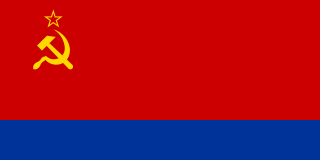
The Azerbaijan Soviet Socialist Republic, also referred to as the Azerbaijani Soviet Socialist Republic, Azerbaijan SSR, Azerbaijani SSR, AzSSR, Soviet Azerbaijan or simply Azerbaijan, was one of the constituent republics of the Soviet Union between 1922 and 1991. Created on 28 April 1920 when the Russian Soviet Federative Socialist Republic brought pro-Soviet figures to power in the region, the first two years of the Azerbaijani SSR were as an independent country until incorporation into the Transcaucasian SFSR, along with the Armenian SSR and the Georgian SSR.

An index of articles related to the former nation known as the Soviet Union. It covers the Soviet revolutionary period until the dissolution of the Soviet Union. This list includes topics, events, persons and other items of national significance within the Soviet Union. It does not include places within the Soviet Union, unless the place is associated with an event of national significance. This index also does not contain items related to Soviet Military History.

Sergo Konstantinovich Ordzhonikidze was a Georgian-born Bolshevik and Soviet politician.

The August Uprising was an unsuccessful insurrection against Soviet rule in the Georgian Soviet Socialist Republic from late August to early September 1924.
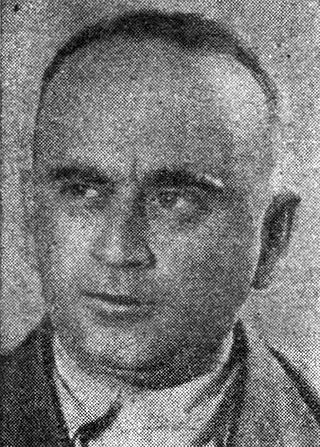
Vladimir Georgievich Dekanozov was a Soviet senior state security operative and diplomat.

Mikhail Petrovich Frinovsky was a Soviet secret police official who served as a deputy head of the NKVD under Nikolai Yezhov during the Great Purge.
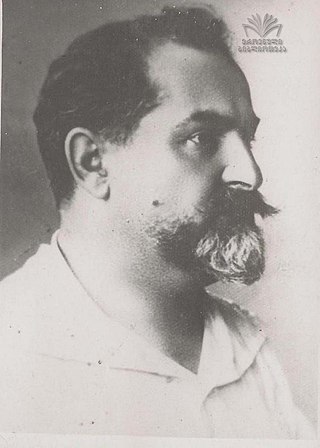
Polikarp "Budu" Gurgenovich Mdivani was a veteran Georgian Bolshevik and Soviet government official energetically involved in the Russian Revolutions and the Civil War. In the 1920s, he played an important role in the Sovietization of the Caucasus, but later led Georgian Communist opposition to Joseph Stalin's centralizing policy during the Georgian Affair of 1922. He was executed during the Great Purge.

Aziz Mammad Karim oghlu Aliyev was an Azerbaijani, Dagestani, and Soviet politician, scientist, and member of the Supreme Soviet of the USSR. He was the father-in-law of Azerbaijan's President Heydar Aliyev, who married his daughter Zarifa Aliyeva, and maternal grandfather of Azerbaijan's current President Ilham Aliyev and brother of Shamama Alasgarova, who was a doctor.
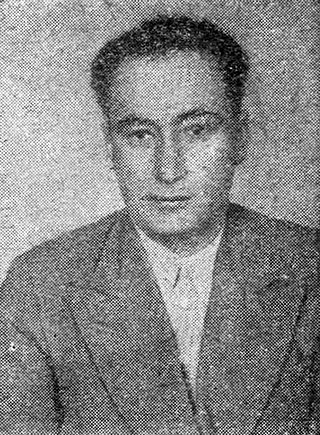
Grigory Artemievich Arutinov or Grigor Artemi Harutyunyan was the First Secretary of the Communist Party of the Armenian SSR from 24 September 1937 to 12 March 1953. His tenure as first secretary was the longest in the history of the Armenian SSR.

Sergey or Sergo Kavtaradze was a Soviet politician and diplomat who briefly served as head of government in the Georgian SSR and as Deputy Prosecutor General of the Soviet Union. A Georgian Bolshevik activist, he was persecuted for his Trotskyist activities, but was pardoned and reinstated by his personal friend Joseph Stalin.

Mir Teymur Mir Alakbar oghlu Yagubov was an Azerbaijani politician who served as the First Secretary of the Central Committee of the Azerbaijan Communist Party between 1953 and 1954.
Ruben Gukasovich Rubenov, also known as Ruben Mkrtichyan, was a Bolshevik revolutionary and Soviet politician who served as the 6th First Secretary of Azerbaijan Communist Party and revolutionary.
Ayyub Shirin oglu Khanbudagov was Chairman of the Extraordinary Commission (Cheka) of Azerbaijan and Secretary of the Central Committee of the Azerbaijan Community Party (ACP).

Yefim Georgievich Yevdokimov was a Soviet politician and member of the Cheka and OGPU. He was a key figure in the Red Terror, the Great Purge and dekulakization that saw millions of people executed and deported.
Baghirov is an Azerbaijani masculine surname derived from the male given name Baghir + Russian suffix -ов (-ov). Its feminine counterpart is Baghirova (Azerbaijani: Bağırova; Russian: Вагирова, romanized: Bagirova.
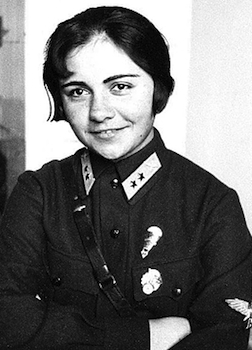
Zuleykha Seyidmammadova was one of the first Azerbaijani female pilots, and the first Azerbaijani woman to fly in combat.

Aleksandr Vasilyevich Kosarev was a Soviet politician and Communist Party official who was active in the youth movement. He served as the 7th First Secretary of the Central Committee of the Komsomol. He played a critical role in promoting the idea of Nikolai Starostin in establishment of professional football competitions in front of the Soviet Council on Physical Culture.

Stalinist repressions in Azerbaijan were repressions carried out in the Azerbaijan SSR from the late 1920s to the early 1950s that affected not only the top leaders of Azerbaijan, but also the clergy, intellectuals, wealthy peasants, and the entire population of Azerbaijan. Repressions included shooting, arresting, sending to labor camps, and deporting the population to other regions of the USSR. People suspected of counter-revolutionary activity, espionage, anti-Soviet propaganda, or obstructing the nationalization of their property were persecuted.
References
- ↑ "В Индии скончался сын коммунистического вождя Азеpбайджана" [Son of the Azerbaijani leader died in India]. Novosti.ru. 2005-04-09. Retrieved 2010-05-04.
- ↑ "Stalin's Personality Cult. Three Times I Changed My Mind". Azerbaijan International . September 1999. Retrieved 2010-05-04.
- 1 2 "Directory of Biographies. Mir Jafar Baghirov". Archived from the original on 2011-07-06. Retrieved 2010-05-04.
- 1 2 Rumyantsev, Vyacheslav (ed.). "Багиров Мир Джафар Аббасович 1896-1956 Биографический указатель". Chronos. Retrieved 19 January 2022.
- ↑ Beria, Sergo (2001). Beria, My Father: Inside Stalin's Kremlin. London: Duckworth. p. 300. ISBN 0-7156-3062 8.
- ↑ Medvedev, Roy (1976). Let History Judge, The Origins and Consequences of Stalinism. Nottingham: Spokesman. p. 344.
- ↑ Conquest, Robert (1961). Power and Policy in the U.S.S.R. London: MacMillan. p. 197.
- ↑ Conquest. Power and Policy. pp. 451–453.
- ↑ "Republic of Azerbaijan. Ministry of National Security. Heads of special services of Azerbaijan. Mir Jafar Baghirov". Archived from the original on 2010-10-15. Retrieved 2010-05-04.
- ↑ Swietochowski, Tadeusz; Collins, Brian C. (1999). Historical dictionary of Azerbaijan. Lanham, Maryland: Scarecrow Press, Inc. p. 31. ISBN 0-8108-3550-9 . Retrieved May 3, 2010.
- ↑ De Waal, Thomas (2003). Black garden: Armenia and Azerbaijan through peace and war. New York and London: New York University. p. 138. ISBN 0-8147-1944-9 . Retrieved May 4, 2010.
- ↑ "Фамилии летчиков, совершивших воздушные тараны" [Last names of pilots involved in ram attacks]. Retrieved 2010-05-04.
External links
- (in Russian) Biography of M. J. Baghirov
- "Hey Ismayil, Make Him Understand" (1962). A satire about Mir Jafar Baghirov by Azerbaijani writer Mir Jalal at AZER.com, Azerbaijan International, Vol. 7:1 (Spring 1999), p. 43.
Mir Jafar Baghirov | |
|---|---|
Mir Cəfər Bağırov | |
 Baghirov in 1948 | |
| First Secretary of the Central Committee of the Communist Party of Azerbaijan | |
| In office 10 December 1933 –18 April 1953 |
